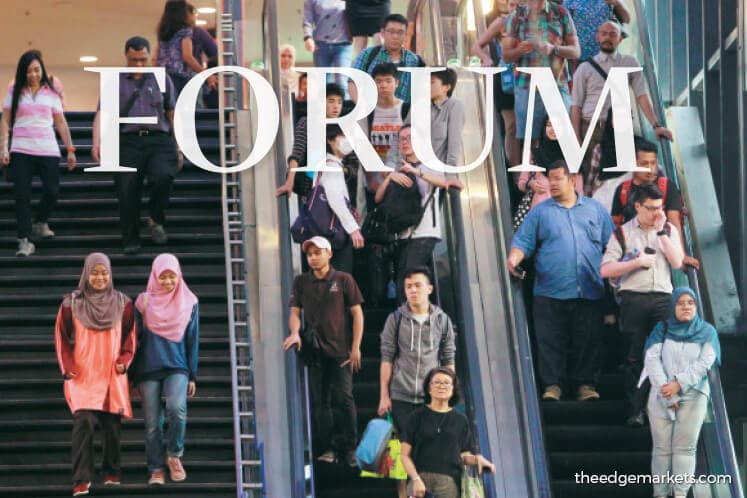
This article first appeared in Forum, The Edge Malaysia Weekly on March 30, 2020 - April 5, 2020
Malaysian politics is largely racial. It is racial to such an extent that religion is popularly connected to race. And so, the greatest challenge that the Pakatan Harapan (PH) government faced when it took power in May 2018 was in developing and propagating for a new national conversation, and the inability on the part of many of their leaders to imagine what the content of a new national discourse should be.
They failed to realise that the citizenry’s attention needed to be focused on matters that can be discussed much less emotively than issues of race and religion, and that can dissolve popular Malay anxieties.
The latter translates into socioeconomic policies on the one hand and, on the other, a centring on “Malaysian-ness” — meaning its stature and pride of place among other nations — instead of ethnicity. Placing Malaysia in a global context as a progressive and open society was therefore one of the first things that PH put considerable effort into.
The need for socioeconomic optimism to flow from the centre to the rest of the country was very slow in coming. The dramatic moves needed to excite the population and convince them that new times were here did not happen. Reforms without drama do not win points. And given PH’s weaknesses post-GE14 to dominate the traditional media and the social media, whatever it managed to achieve was seen to be half-hearted and unconvincing.
PH managed to come to power thanks to the strange situation of the old prime minister Datuk Seri Najib Razak having gone so far in his mismanagement of the country and its economy, including his apparent insufficient regard for the working-class Malays, that the old retired prime minister, Tun Dr Mahathir Mohamad, chose to return to topple him.
With the middle-class Malays ashamed of him, the working class wary of him, and Mahathir hating his guts, Najib now ends up being remembered in history as the man to blame for Barisan Nasional’s fall from power.
The PH which contested in 2018 managed to put on a show of being an ideologically coherent coalition. This included its good fortune of being able to use one party flag — PKR’s — as a signifier for all the four parties.
But while the original PH members — PKR, DAP and Amanah — had gone through the test by fire of the 2008 and 2013 elections, and many other challenges together, Bersatu’s inclusion into PH as an electoral tactic made for a coalition that was novel, and therefore less coherent and more tentative in public proclamations and in governance. After toppling Najib, PH showed itself to be lacking in conviction and in engagement towards its own cause.
However skilful he may have been as a prime minister, Mahathir was head of a party that was willing to accommodate former Umno members, while his coalition partners were not only Umno’s sworn enemies but also self-styled reformists who wished to replace race-based politicking with something else.
Quite obviously, the alternative had to make socioeconomics and class analysis in some form or other the core for a new national discourse. But more than that — and this was probably not clear to most of PH’s leaders — promoting “Malaysian-ness” as the sense and source of pride for individual Malaysians is vital. The domestic discourse on race can be diluted by socioeconomic policies and data but improving the external image of Malaysia as a progressive nation and as a moral example for poorer and smaller countries would have provided an emotive and necessary replacement to the introverted inter-communal distrust that has plagued the country for so long.
Nation building, a necessarily assertive attitude, is about the maturing of Malaysia as a nation among nations more than it is about managing the distrust of domestic collectives. And identity politics is more about social mobility, individual integrity and pride than it is about this loose concept Malaysians love so much — race. Malaysians do seem to avoid the thought that their economy is extremely dependent on the rest of the world, blinded as they are by domestic distractions.
PH may now have been replaced in Putrajaya by the Perikatan Nasional (PN) government with almost minimal representation for the main minorities but the problem remains the same — it is about economics and it is about international standing. The economy is in dire straits and near-future prospects in the wake of Covid-19 are lacklustre at best.
A leap ahead is needed. What the new government should try to do, instead of going for small gains with an eye on the next election, is to focus on enhancing social mobility at the people level, and to promote people-to-people business and other ties between Malaysians and their neighbours.
The neighbours of Malaysians are not other Malaysians from distrusted communities. They are, instead, Thais, Myanmar, Vietnamese, Laotians and Cambodians to the north, and Indonesians, Singaporeans, Bruneians and Filipinos in all other directions. What a rich life, full of opportunities, awaits Malaysians, if they would only stop being fascinated by their own navel.
The current government, any Malaysian government for that matter, needs to seek strong ties and benefits from the country’s national neighbours. There is potentially much to be gained for individual Malaysians and corporations in orientating themselves outwards, and the benefits will be therapeutic — economically, culturally or in its effects on personal (in contrast to collectivised) identity.
Dr Ooi Kee Beng is executive director of Penang Institute. Among his recent books is Catharsis: A Second Chance for Democracy in Malaysia (2018). www.wikibeng.com.
Save by subscribing to us for your print and/or digital copy.
P/S: The Edge is also available on Apple's AppStore and Androids' Google Play.